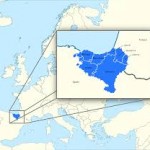The Basque dialect, or Euskara, is quite unlike other Spanish dialects in that it is not a Romance language; in fact it is classed as a

Lingua Clinic Spanish Tutor London
‘language isolate’, that is a language with no demonstrable relationship with another language. Known in Spanish as el vasco, la lengua vasca or el euskera, it is spoken by some of the indigenous people of the Basque country, which covers Northeast Spain and Southwest France.
Basque has several sub-dialects not all of which are mutually intelligible, so a standardised form, called Euskara Batua, was introduced in the late 1960s by the Basque Language Academy for use in education and other formal settings to make it possible for all Basque speakers to understand one another. Basque, like other dialects, was suppressed during the Franco years but during the 1980s steps were taken to strengthen the language and it is now spoken by some 700,000 people (around 27% of the population) in the Basque regions.
The origins of Basque are uncertain, but its use can be traced back many centuries. We know that it dates back at least as far as 1349, when a law was passed making the use of Basque, Arabic and Hebrew punishable by a fine of 30 sols. However, it is likely to have its origins much earlier, developing before the arrival of the Romance languages spoken in the surrounding areas, and possibly even as far back as the Stone Age.
While it is interesting to know some of the history of minority languages like Basque, it is the standard Castellano which you will need to communicate in Spain and Latin America. Our intensive Spanish lessons are an excellent choice if you wish to learn Spanish quickly.